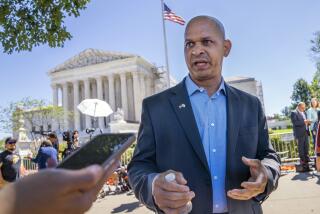Egyptian police step out of the shadows
CAIRO -- The policemen in their white uniforms and tilted berets are back, patrolling neighborhoods, protecting schools, writing tickets and, when the summer heat reaches its pitch, napping in the clamorous shade along the Nile.
Once the reviled face of a repressive state, Egyptâs police, like many politicians and public institutions here, are in the midst of reinvention. The reemergence of security forces comes after months of their lying low to create a security vacuum to undermine the government of President Mohamed Morsi. Their return indicates that the coup that overthrew Morsi on July 3 had the backing of power brokers opposed to his Islamist-led rule.
The police were accused of decades of human rights abuses under longtime President Hosni Mubarak, whose toppling in a 2011 uprising led to the election of Morsi and the ascendancy of the Muslim Brotherhood movement. Security forces distrusted Morsi and police were torn in their loyalties. Thousands disappeared from the streets and plotted the presidentâs downfall; others protected Morsiâs government from protesters by turning to the same sort of brutal tactics employed during the Mubarak era.
Many believe the new military-backed government, desperate to stem soaring crime and economic turmoil, will brush aside the policeâs sins of the past, including the deaths of more than 800 anti-Mubarak protesters in the upheaval two years ago. It is a strained revisionism designed to keep the police beholden to a government seeking to quickly move beyond the military overthrow of the nationâs first freely elected president.
âMorsiâs biggest mistake was serving only the interests of the Muslim Brotherhood,â said Mohammed Adel, a Cairo policeman. âHe wanted to make the Interior Ministry weak so the only real force in the country would be the Brotherhood militias.â
Police and security forces âbelieve they are part of the June 30 revolution,â said Ihab Youssef, a retired Egyptian police colonel who runs a security company, referring to the protests that ultimately helped bring down Morsi. âThey gave the people the courage to go into the streets and express themselves because they knew the Interior Ministry wasnât against them anymore.â
In scenes that would have been unthinkable during Mubarakâs reign, uniformed police officers linked arms with anti-Morsi demonstrators and chanted, âThe police and the people are one hand!â One officer proclaimed in a TV interview: âMr. President, you are no different than President Mubarak in any way. We ask of you to leave; leave to prevent bloodshed.â
Morsi often attempted to win the allegiance of police even as he warned that the âdeep stateâ -- a network of businessmen and security and judiciary officials -- sought to sabotage his government. No doubt the deposed presidentâs political miscalculations and Islamist agenda were instrumental to his downfall, but with the military again in charge and the police on the streets in full force, his fear appears to have been realized.
Hundreds of Brotherhood members, including many of its leaders, have been arrested. Morsi has been detained without formal charges. At least eight new Cabinet ministers were once connected to Mubarakâs National Democratic Party, and the state-controlled news media are now helping reshape reality, casting Islamists as terrorists and the generals and police as saviors.
âThe people are standing with the police now,â said one officer in a traffic circle, who, like many street cops, would not give his name. âThe police were blamed for many things after the 2011 revolution. People lost all shame. Crime went up and people jumped at the opportunity when they heard the police were broken. But we were always here, even as Morsi tried to eliminate everyone, including us.â
Across the railroad tracks, another on-duty officer washed his feet and hands to answer the call to prayer. As he hurried toward a mosque, he said, âMany of our orders over the last year were to work against Morsi. Our police commanders didnât want Morsi in power.â
Even the secular opposition that once condemned the police and military has tempered its criticism. How long the goodwill will last is uncertain. But the security forcesâ image has improved as Egyptians seek protection from crime -- killing, armed robbery and weapons smuggling among them -- that has steadily spiraled upward over the last two years.
Zahra Said, whose brother Khaled was beaten to death by police, sparking protests against brutality that helped inspire the 2011 uprising, has a double-edged view of police. She wants her brotherâs killers, who face retrial this year, brought to justice. Yet she also said that a lack of security was undoing the nation.
âThose [policemen] who committed crimes must be held accountable,â she said. âBut you canât ask for everything all at once. Things have to calm down first before we ask for that. You keep hearing about shootings and things happening all around the country.â
She added, âIâm all for human rights, but someone carrying a weapon can hurt or kill someone on the street, and this is where the line is drawn, because this concerns my rights and my safety. I have the right to live in safety.â
Many police say Morsiâs downfall will spur a more prosperous and less politically divisive era.
âPeople in this country are poor and out of work,â said Ashraf Moharram, a traffic cop in Giza. âThe Muslim Brotherhood and Morsi were not able to create any real change and created a divide between the people of this country more than ever before.... People now want to embrace each other.â
--
Hassieb is a special correspondent. Times staff writer Shashank Bengali contributed to this report.
More to Read
Sign up for Essential California
The most important California stories and recommendations in your inbox every morning.
You may occasionally receive promotional content from the Los Angeles Times.











